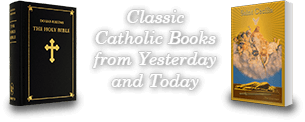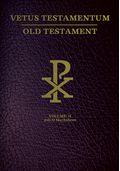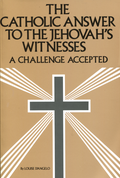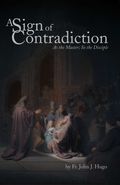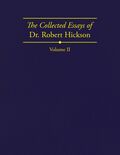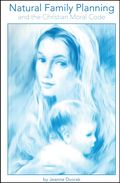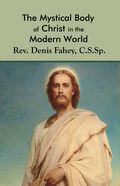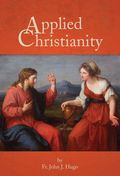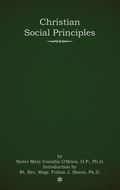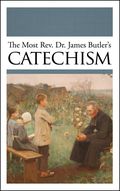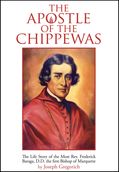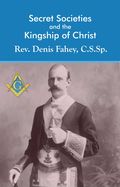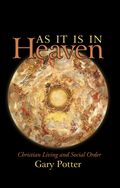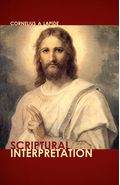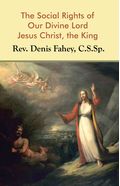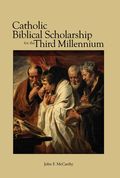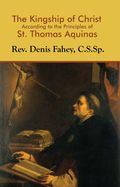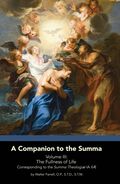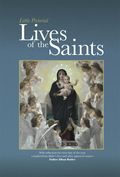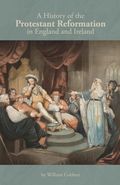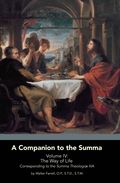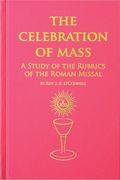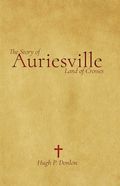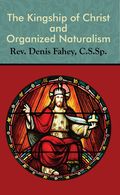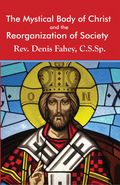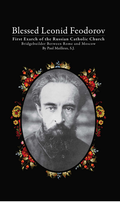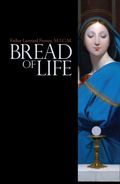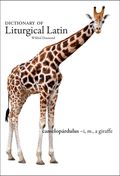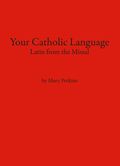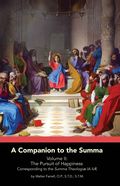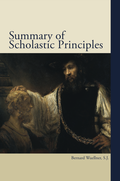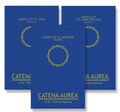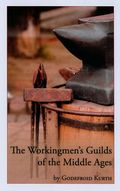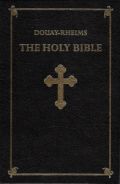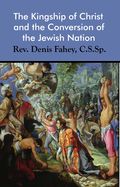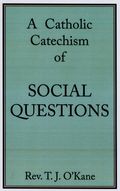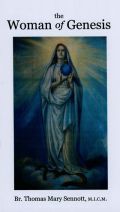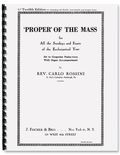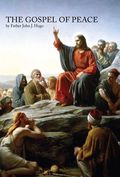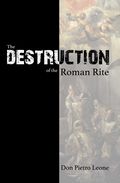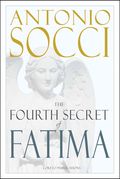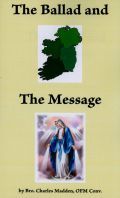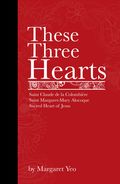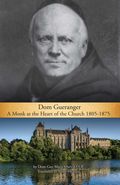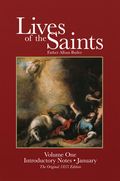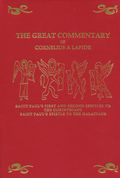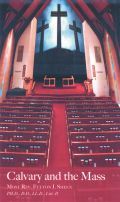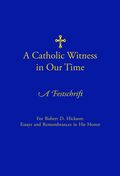Categories
Information
All Products
THE VULGATE IS THE OFFICIAL BIBLE OF THE CATHOLIC CHURCH
ALSO AVAILABLE AS A THREE VOLUME COMPLETE MATCHING SET
Vol. One includes the books from Genesis to Esther - 1080 pages
Vol. Two includes the books from Job to Machabees II -1040 pages
In keeping with the wishes of the Holy Father, Benedict XVI, Loreto Publications has published this truly unique edition of the Bible in Latin and English. Suitable either for students of theology and the Scriptures, for those studying Latin, or just for Catholics who wish to conduct themselves according to the mind of the Church, this edition brings together two classic versions of the Bible which have served Catholics well, down through the centuries.
- One Volume New Testament
- Two Volumes Old Testament
- Clear Typeface
- Burgundy bonded leather cover
- English column opposite Latin column
Download a free sample from this book.
Acts of the Apostles - Chapter 27:11-40
11 But the centurion believed the pilot and the master of the ship, more than those things which were said by Paul.
12 And whereas it was not a commodious haven to winter in, the greatest part gave counsel to sail thence, if by any means they might reach Phenice to winter there, which is a haven of Crete, looking towards the southwest and northwest.
They weather a great storm
13 And the south wind gently blowing, thinking that they had obtained their purpose, when they had loosed from Asson, they sailed close by Crete.
14 But not long after, there arose against it a tempestuous wind, called Euroaquilo.
15 And when the ship was caught, and could not bear up against the wind, giving up the ship to the winds, we were driven.
16 And running under a certain island, that is called Cauda, we had much work to come by the boat.
17 Which being taken up, they used helps, undergirding the ship, and fearing lest they should fall into the quicksands, they let down the sail yard, and so were driven.
18 And we being mightily tossed with the tempest, the next day they lightened the ship.
19 And the third day they cast out with their own hands the tackling of the ship.
20 And when neither sun nor stars appeared for many days, and no small storm lay on us, all hope of our being saved was now taken away.
Paul declares that all are to be saved
21 And after they had fasted a long time, Paul standing forth in the midst of them, said: You should indeed, O ye men, have hearkened unto me, and not have loosed from Crete, and have gained this harm and loss.
22 And now I exhort you to be of good cheer. For there shall be no loss of any man’s life among you, but only of the ship.
23 For an angel of God, whose I am, and whom I serve, stood by me this night,
24 Saying: Fear not, Paul, thou must be brought before Caesar; and behold, God hath given thee all them that sail with thee.
25 Wherefore, sirs, be of good cheer; for I believe God that it shall so be, as it hath been told me.
26 And we must come unto a certain island.
He exhorts them to take some food
27 But after the fourteenth night was come, as we were sailing in Adria, about midnight, the shipmen deemed that they discovered some country.
28 Who also sounding, found twenty fathoms; and going on a little further, they found fifteen fathoms.
29 Then fearing lest we should fall upon rough places, they cast four anchors out of the stern, and wished for the day.
30 But as the shipmen sought to fly out of the ship, having let down the boat into the sea, under color, as though they would have cast anchors out of the forepart of the ship,
31 Paul said to the centurion, and to the soldiers: Except these stay in the ship, you cannot be saved.
32 Then the soldiers cut off the ropes of the boat, and let her fall off.
33 And when it began to be light, Paul besought them all to take meat, saying: This day is the fourteenth day that you have waited, and continued fasting, taking nothing.
34 Wherefore I pray you to take some meat for your health’s sake; for there shall not an hair of the head of any of you perish.
35 And when he had said these things, taking bread, he gave thanks to God in the sight of them all; and when he had broken it, he began to eat.
36 Then were they all of better cheer, and they also took some meat.
37 And we were in all in the ship, two hundred threescore and sixteen souls.
38 And when they had eaten enough, they lightened the ship, casting the wheat into the sea.
The all escape unharmed
39 And when it was day, they knew not the land; but they discovered a certain creek that had a shore, into which they minded, if they could, to thrust in the ship.
40 And when they had taken up the anchors, they committed themselves to the sea, loosing withal the rudder bands;
Actus Apostolurum - Chapter 27:11-40
11 Centurio autem gubernatori et nauclero magis credebat, quam his quæ a Paulo dicebantur.
12 Et cum aptus portus non esset ad hiemandum, plurimi statuerunt consilium navigare inde, si quomodo possent, devenientes Phœnicen hiemare, portum Cretæ respicientem ad Africum et ad Corum. Patiuntur magnam tempestatem
13 Aspirante autem austro, æstimantes propositum se tenere, cum sustulissent de Asson, legebant Cretam.
14 Non post multum autem misit se contra ipsam ventus typhonicus, qui vocatur Euroaquilo.
15 Cumque arrepta esset navis, et non posset conari in ventum, data nave flatibus, ferebamur.
16 In insulam autem quamdam decurrentes, quæ vocatur Cauda, potuimus vix obtinere scapham.
17 Qua sublata, adjutoriis utebantur, accingentes navem, timentes ne in Syrtim inciderent, summisso vase sic ferebantur.
18 Valida autem nobis tempestate jactatis, sequenti die jactum fecerunt:
19 et tertia die suis manibus armamenta navis projecerunt.
20 Neque autem sole, neque sideribus apparentibus per plures dies, et tempestate non exigua imminente, jam ablata erat spes omnis salutis nostræ. Affirmat Paulus omnes salvandos esse
21 Et cum multa jejunatio fuisset, tunc stans Paulus in medio eorum, dixit: Oportebat quidem, o viri, audito me, non tollere a Creta, lucrique facere injuriam hanc et jacturam.
22 Et nunc suadeo vobis bono animo esse: amissio enim nullius animæ erit ex vobis, præterquam navis.
23 Astitit enim mihi hac nocte angelus Dei, cujus sum ego, et cui deservio,
24 dicens: Ne timeas, Paule: Cæsari te oportet assistere: et ecce donavit tibi Deus omnes qui navigant tecum.
25 Propter quod bono animo estote, viri: credo enim Deo quia sic erit, quemadmodum dictum est mihi.
26 In insulam autem quamdam oportet nos devenire.
Hortatur eos ad cibum sumendum
27 Sed posteaquam quartadecima nox supervenit, navigantibus nobis in Adria circa mediam noctem, suspicabantur nautæ apparere sibi aliquam regionem.
28 Qui et summittentes bolidem, invenerunt passus viginti: et pusillum inde separati, invenerunt passus quindecim.
29 Timentes autem ne in aspera loca incideremus, de puppi mittentes anchoras quatuor, optabant diem fieri.
30 Nautis vero quærentibus fugere de navi, cum misissent scapham in mare, sub obtentu quasi inciperent a prora anchoras extendere,
31 dixit Paulus centurioni et militibus: Nisi hi in navi manserint, vos salvi fieri non potestis.
32 Tunc absciderunt milites funes scaphæ, et passi sunt eam excidere.
33 Et cum lux inciperet fieri, rogabat Paulus omnes sumere cibum, dicens: Quartadecima die hodie exspectantes jejuni permanetis, nihil accipientes.
34 Propter quod rogo vos accipere cibum pro salute vestra: quia nullius vestrum capillus de capite peribit.
35 Et cum hæc dixisset, sumens panem, gratias egit Deo in conspectu omnium: et cum fregisset, cœpit manducare.
36 Animæquiores autem facti omnes, et ipsi sumpserunt cibum.
37 Eramus vero universæ animæ in navi ducentæ septuaginta sex.
38 Et satiati cibo alleviabant navem, jactantes triticum in mare.
Omnes evadunt incolumes
39 Cum autem dies factus esset, terram non agnoscebant: sinum vero quemdam considerabant habentem littus, in quem cogitabant si possent ejicere navem.
40 Et cum anchoras sustulissent, committebant se mari, simul laxantes juncturas gubernaculorum: et levato
192 pages, softcover
By Louise D'Angelo
This book presents to the reader the information which they need to protect their own faith or the faith of someone they love from the attacks of the Witnesses. This book was written after 16 years of toil and research by the author. There is nothing like it in print today. It contains full explanations of what the Witnesses believe and how they use the Bible to try to trap unsuspecting Catholics.
Fr. John Hugo - 422 Pages - EBOOK - PDF, Kindle, & EPUB
Fr. Onesimus Lacouture was a Jesuit who had the great gift of being a masterful director of souls. Being a Jesuit formed in the old mold of true Ignatian spirituality and deeply affected by the so-called “French School” of Cardinal Berulle, St. John Eudes, and St. Louis Marie de Montfort, his retreats, given to over 6000 American and Canadian priests, produced extraordinary results. His most well known disciple and good friend, Fr. Hugo, has produced for posterity, the Notes from those Ignatian retreats as given by Fr. Lacouture and subsequently by himself and many other priests.
A Sign of Contradiction is Fr. Hugo’s apologia for the work of Fr. Lacouture and the “spiritual movement” that grew spontaneously from the ardent, enlightened, and effective preaching of the retreats. He describes the movement, its opponents and its supporters as well as the revelatory doctrines so convincingly presented by Fr. Lacouture.
This book is spiritually motivating, historically informative, and powerfully illuminating in regard to the condition of the Church and the faithful in North America during the mid-twentieth century. The Gospel of Peace, and Applied Christianity (the retreat notes of Fr. Lacouture) by Fr. Hugo are also available from Loreto Publications.
Hardcover - 8.5" x 11" 680 pages
Loreto Publications is pleased to present almost 100 essays from one of the most fascinating Catholic American essayists of our post Vatican era. Robert Hickson's broad experience and deep personal knowledge of politics, military affairs, literature, and religion in late 20th century America give him a unique perspective and judgement that is thoroughly Catholic and poingnantly expressive. His curriculuum vitae is impressive and his experience as a soldier, college professor, public speaker, husband, father, and traditional Catholic warror are evident in these profound and penetrating writings.
FOREWORD
It is part of the vocation of a small Catholic publisher like Loreto Publications to give voice not only to the accumulated wisdom of past ages, but also to make known the effects of grace in the souls of the men and women whose lives run concurrent with our own, when those effects are worth noting and preserving for future generations. If the effects of supernatural grace manifest themselves in the remarkable written expression of a Catholic warrior, it can be a great benefit for others to read and contemplate the procession of thought produced by
those effects in a man of substantial educational attainments and wide experience. This is why we have chosen to make available this selection of almost 100 essays by our good friend Dr. Robert Hickson.
One of the requirements for the acquisition and growth of virtue that nature and grace impose upon a man is that he make a serious attempt to impose order in this world of disorder. First he must order his own thoughts and passions, and then he may seek to promote order in his own sphere of influence in the world. This is the work of a Christian educator. The artfully composed and clearly enunciated order of Dr. Hickson’s thinking is strikingly evident in the writings of his mature years as presented in these two volumes. Not only does he beautifully expound upon a topic, but he gently coaxes the reader to make further considerations of his own on the topic presented. In other words, he stimulates the thinking process in his audience and he arouses the desire of the intellect for deeper and more fruitful contemplation. Surely, the achievement of that objective is one of the many goals of sound education.
These essays are not the work of a superficial man. They are challenging, and were meant to be so. In his essay “The Contribution of Catholic Letters to the Conversion of Our Country” you will find the following paragraph:
G. K. Chesterton, who was himself a Catholic Man of Letters, memorably said, moreover, that “the test of all happiness is gratitude” and “your world would be a lot larger, if you were smaller in it.” And, with the help of such Catholic Letters and Literature, we may also help to
make that world larger for others, unto their more abundant life, both here and in Beatitude.
That paragraph could easily serve as the Introit to all of Dr. Hickson’s literary efforts. And so it is with a constantly enlarging sense of gratitude that we offer to our loyal followers these two volumes in hope that you too will appreciate this twentieth century Catholic American soldier’s literary legacy.
Jeanne Dvorak - 88 pages - EBOOK as PDF, EPUB, or Kindle
This book was written by a Catholic mother of 14 and grandmother of 50 and counting…. It reiterates the constant and never-changing Catholic teaching on NFP.The Catholic faithful have been mislead into thinking that NFP (it is ANYTHING but natural and does not produce families - it damages them) is not contrary to the Catholic faith. Acceptance of this fatal error has afflicted many Catholics for the last 70 years, and the acceptance of that practice has caused untold suffering and the decay and destruction of countless Catholic marriages and families. This short and powerful book will demolish any notions you may entertain that one can live a faithful and holy life while practicing “Catholic birth control.” There is no such thing!
NFP is contrary to Nature and to God's will. God plans families—not us.
Natural Family Planning and the Christian Moral Code by Jeanne Dvorak, is in its fourth printing. This book reaffirms that NFP was just a novel and sinful introduction to the modern Catholic world. This compact treatise now includes a 1940 letter from the Archbishop of St. Paul, MN, in which NFP is condemned. Natural Family Planning and the Christian Moral Code does more than just examine the negative. It allays fears and bolsters confidence through its many stories and examples of obedient Catholic parents living their family life with faith and trust in God. Children are the first purpose of marriage – better to have them on your lap than on your conscience!
Father Denis Fahey - PB - 440 pages
The principal purpose of The Mystical Body of Christ in the Modern World is to deal, from the theological, philosophical and historical standpoint, with the modern revolt against the divine plan for the organisation of human society.
Dr. Fahey writes at length of the various errors and the nefarious forces which at present menace the divinely-constituted social order. His work is a most important one. Perhaps never before, since the establishment of Christianity, has there been such an organized effort to overthrow it, to dethrone Christ, to destroy His Church, to set aside God and the order which He has established. In some countries, notably Russia, Mexico, and Spain, the veil of secrecy has been withdrawn; in many others the same Masonic and Communistic influences are at work, but their activities are to a large extent underground.
An essential prerequisite for a proper preparation (to defend the Church) is a knowledge of the nature and extent of the menace, of the organization of the forces behind it, and of the diabolical hatred of Christianity and of everything supernatural with which these forces are imbued. This knowledge is to be found in Dr. Fahey’s work; in fact nowhere else, as far as we know, is there such a logical, co-ordinated treatment of the subject.
Father John J. Hugo - 330 pages - Ebook as EPUB, Kindle, or PDF
This is the second of three books written by Fr. John J. Hugo concerning the great 20th century spiritual retreat master, Fr. Onesimus Lacouture S.J. and his work. The first published by Loreto was The Gospel of Peace, and the third to be re-issued is entitled A Sign of Contradiction.
Fr. Lacouture was a Jesuit who had the great gift of being a masterful director of souls. Being a Jesuit formed in the old mold of true Ignatian spirituality and deeply affected by the so-called “French School” of Berulle, St. John Eudes, and St. Louis Marie de Montfort, his retreats, given to over 6000 American and Canadian priests, produced extraordinary results. His most well known disciple and good friend, Fr. Hugo, has produced for posterity, the Notes from those Ignatian retreats as given by Fr. Lacouture and subsequently by himself and many other priests.
The Notes are entitled Applied Christianity and few spiritual writers of the 20th century have put in such clear and lucid language a precise (and practical) explanation of the true nature of a Christian life. This work will be compared to the works of such great writers on the spiritual life as St. John Eudes, Abbot Dom Marmion, Dom Chautard, St. Ignatius of Loyola and others.
Part One: Natural and Supernatural
I. The Two Principles of Activity
II. The Two Principles of Activity: Application
III. The Harmony Between the Natural and the Supernatural
IV. The Conflict Between the Natural and the Supernatural
V. The Pagan Mentality
VI. The Law of the Flesh
VII. Jesus Speaks of the Supernatural Life
VIII. The Christian Mentality
IX. Christian Perfection
Part Two: The Supernatural World
I. The Glory of God: Doctrine
II. The Glory of God: Application
III. The Doctrine of the Samples
IV. The Doctrine of the Samples Applied
V. The Supreme Dominion of God: Doctrine
VI. The Supreme Dominion of God: Application
VII. The Folly of the Cross: Doctrine
VIII. The Folly of the Cross: Application
IX. Summary and Objections
Part Three: The Samples
I. The Love of God
II. The Contempt of the World: Doctrine
III. The Contempt of the World: Application
IV. Forbidden Samples
V. Sin
VI. The Remedies for Sin
VII. Hell
Part Four: The Supreme Dominion of God
I. The Supreme Dominion: God’s Intention
II. The Supreme Dominion in Persons: Blind Instruments
III. The Supreme Dominion in Superiors: Obedience
IV. Source of God’s Supreme Dominion: The Divine Will
V. The Supreme Dominion of God in us: The Human Will
Part Five: The Folly of the Cross
I. Almsgiving: The Sowing of External Goods
II. Mortification: The Sowing of Bodily Goods
III. Afflictions: The Sowing of Interior Goods
IV. Death: The Sowing of Everything
Appendix
I. Nature and Grace
II. Are Natural Actions Meritorious?
III. Christian Moderation
Sr. Mary Concilia O'Brien - Hardcover - 478 pages
This brilliantly concieved and executed textbook was published for Catholic High School & College students. It was published in 1941 and it is still one of the clearest and succinct summaries of Catholic Social teaching. It draws primarily on the teaching of St. Thomas in the Summa and the papal encyclicals of Leo III and Pius XI. There are chapter summaries, questions for further discussion, lists of primary sources quoted, an extensive index, and suggested reading for advanced students. This is an invaluable resource for neophytes in the study of the Church's social doctrines.
Fr. Walter Farrell, O. P. - Hardcover 408 pages
This magnificent set of four books is an exposition and guide to the entire Summa of Saint Thomas Aquinas. It was written by one of the premier Dominican Thomistic scholars who were active in the scholastic revival of the 1930s and 40s. These books contain the entire Summa transposed into modern English prose, thereby making accessible, for those who are not trained philosophers, the complete theology of Saint Thomas’s Summa.
The composition of these four books matches up perfectly with each of the 614 questions of the Summa. This book is meant to be read alongside the actual Summa in order to make it more easily understood by the average reader.
Volume One
This volume attempts to put in popular form St. Thomas’ masterly study of God, man, and the world in the Prima Pars of his Summa Theologica. His study is of extreme pertinence to our times precisely because we are the victims of a constantly increasing intellectual confusion. We have become more and more timid about digging beneath the surface of life, more and more emphatic about a knowledge of facts, less and less concerned with the wisdom of beginnings and ends. To put it baldly, we have concentrated more and more on the physical world and less and less on man and on God. The fact is, however, that exclusive concentration on a study of the world does not unearth the important truths about the world; an exclusive consideration of man and the world results in a blurred, distorted vision of both. We have tried to know only the world and remained most ignorant of it; to know only man and the world and have become entangled in a mass of meaningless detail. For the world is intelligible only in terms of man and God; man is intelligible only in terms of God; God is intelligible only in terms of Himself.
The Most Rev. Dr. James Butler’s Catechism - Small booklet - 88 pages
Revised, Enlarged, Approved, and Recommended by the Four R. C. Archbishops of Ireland as a General Catechism for the Kingdom
Rev. Dr. James Butler, the Bishop of Cashel in Ireland, first published his world-famous catechism in 1775. Soon it became the “official” catechism for all of Ireland, approved for use by all of the bishops. At the Third Council of Baltimore in 1884 it was favored by many U.S. bishops as the basis for the new Baltimore Catechism soon to be published. In the end, the Council decided to use the catechism of St. Robert Bellarmine as the basis for a new catechism for Americans. Butler’s Catechism has always been widely used in the United States as well as the Baltimore Catechism, especially by Americans of Irish descent. At the 1st Council of Quebec it was decided that Butler’s would be the only catechism authorized for the English speaking faithful in Canada, and in 1871 Bishop Lynch of Toronto published it as the official catechism for his diocese. We have compared the various editions approved in Ireland and in Canada and they are (except for some slight re-arrangements in the order of the lessons and some different prayers) the same. This particular printing is that published in Dublin in 1944. It is a wonderfully simple and straightforward catechism useful for children and adults, especially for those who are interested in converting or who have just decided to enter the one true church.
BY JOSEPH GREGORICH - 74 pages - EBOOK - PDF, Kindle, or EPUB
Frederic Baraga was born in Slovenia to a very pious family of the lower nobility when George Washington was president of a newly founded republic in the New World. The ‘Northwest Territories,’ where this newly born child was destined to spend thirty years of his life as a missionary to the Indian Nations of the western Great Lakes, had just been ceded to the new nation upon her independence from England and would soon be incorporated into the United States.
After being counselled by his friend and confessor in Vienna, St. Clement Mary Hofbauer, he was ordained and after a few years service in Slovenia he decided to become a missionary in the new world and was accepted by Bishop Fenwick for work in the diocese of Cincinnatti.
Bishop Baraga was well known and loved during his lifetime, and his letters about his missionary work among the Chippewa and other Indian Nations were published widely in Europe, inspiring Saint John Neumann and Father Francis Xavier Pierz, among many others, to emigrate to the United States. He spent his life working for the conversion of the native inhabitants of this new young nation, and most certainly wished that the Faith would be more widely accepted here by all men, natives and immigrants alike.
Venerable Irenaeus Frederic Baraga (June 29, 1797–January 19, 1868), Pray for us!
Father Denis Fahey - 146 pages - EBOOK as PDF ONLY
“I repeatedly promised Saint Peter that if I ever got the chance, I would teach the truth about his Master in the way he and his successors, the Roman Pontiffs, wanted it done. That is what I have striven to do and am doing.”
—Rev. Denis Fahey
Secret Societies and the Kingship of Christ is a collection of twelve articles that were written by Fr. Fahey and published in The Catholic Bulletin in 1928, the year after he published his first book Mental Prayer According to the Principles of Saint Thomas. Fr. Fahey’s formative educational years coincided with the pontificate of that implacable foe of modernism, St. Pius X , the successor of Leo XIII who had spoken out so stridently against the sect of Freemasonry and naturalism. Attentive to the needs of the Church in his time, Fr. Fahey followed the Leonine instructions given in Humanum Genus article 31; “We wish it to be your rule first of all to tear away the mask from Freemasonry, and to let it be seen as it really is…”
This book is a short, but thoroughly researched and footnoted introduction the the subject of Secret Societies and their impact on the Church, Christian civilization, and modern history.
Gary Potter - 100 pages - Ebook as EPUB, PDF, or Kindle
Gary Potter has been a Catholic journalist and writer of the first rank for over fifty years. As a convert to the Faith during the 1960s, (that time of revolutionary turmoil in the Church and the world), he developed a unique perspective on the Church in the 20th century that has matured over the years into a deep and penetrating vision of our times and the place of the Church and the Faith in the politics of our age.
As it is in Heaven is all about Christian politics. It contains Mr. Potter’s summation of that common worldview that was held by the men who built that civilization known as Christendom during the ages of Faith in the Christian West. He observes its disappearance and describes the effects of its absence on the life of men in our day. He proposes that it will one day be revived in a fashion suitable to modern times.
This extended essay encourages Catholics to face reality in the murky spiritual darkness of our present century. That means that it is also a message of light and hope. Do not be mistaken, Mr. Potter is no silly optimist or clueless observer. He knows the darkness and the dangers as clearly as any living writer, but he is a Catholic through and through, and his judgments are sound and realistic. Catholic realism! A realistic outlook can only come to a Catholic who believes and who tries to live according to that belief. The strength to face reality and to deal with it courageously is what is most necessary to men who wish to truly live—not just pass through this world—and to fight manfully for truth and goodness and beauty during this short pilgrimage that is life on earth.
On Earth, as it is in Heaven is part of the daily prayer of every Catholic, indeed it is also the daily prayer of many who loosely adhere to certain Christian principles, even though they do not yet belong to God’s Church and are therefore far behind on their road to salvation. The subtitle of the book (Christian Living and Social Order) clarifies the challenge. Let us hope and pray that this challenge to live this life as if God really mattered, is heard not only by weak and confused Catholics, but also by all men, who in any way desire to live a virtuous life, make this world a better place in which to live, and to give glory to God by doing His will ON EARTH, as it is already done in Heaven.
by Cornelius aLapide, S.J. - 120 pages - PB
This small book on the interpretation of Holy Scripture is taken from the first volume of the Great Commentary of Cornelius a Lapide. It is comprised of the Foreword to that book and the 120 or so pages of a Lapide’s preface as well as his Chronology of the life of Christ and his priceless Canons (or standard rules) of Scriptural Interpretation that he composed and followed for his lifetime project.
Being, as we at Loreto believe, the best standards of interpretation ever devised, we felt it important that they receive wider readership. Hence this small volume. Should you be so fortunate as to possess his Great Commentary on the Four Gospels this book is redundant, but either way this handy volume is a great reference tool and one of the best introductions to Holy Scripture available today.
TABLE OF CONTENTS
Foreword
General Preface
Chapter One
Chapter Two
Chapter Three
Monotessaron: Chronology of the Life and Work of Christ
Canons of Interpretation
Scriptural References
Adapted from the French of Rev. A. Phillippe, C.S.S.R. - by Rev. Denis Fahey C.S.Sp. - 138 pages
EBOOK as PDF, EPUB, or Kindle
“I repeatedly promised Saint Peter that if I ever got the chance, I would teach the truth about his Master in the way he and his successors, the Roman Pontiffs, wanted it done. That is what I have striven to do and am doing.”
—Rev. Denis Fahey
If one were to state succinctly the predominant supposition that underlies all modern thinking and action regarding human societies it would be that God has no absolute rights over the laws and governments of men; that men are sovereign over their own lives both individually and collectively.
This is the antithesis of reality. It is the devil’s doctrine. “You shall not die the death.You shall be as Gods!” This was the first lie and it is still the most destructive. Belief in that lie is almost universal today, both in thought and in practice.
God is the Creator, Sustainer, Redeemer, Savior, and Sanctifier of all men. All men belong to God and we owe him our love and obedience in every aspect of our lives. Jesus Christ the God-Man is our King by every conceivable right and title, both human and divine. He has the RIGHT to be obeyed and honored by all human societies, especially governments. The Rights of Man are all subject to those of Christ the King, and all so-called ‘human rights’ will disappear if God’s rights are not properly honored by society.
A Comparison of the Traditional and Novus Ordo Rites of the Seven Sacraments
Daniel Graham - 230 pages - EBOOK as PDF
Much has been said lately about the poor catechesis of young Catholics over the past fifty years. One of the most important tools that the Church uses to teach is the words and actions used during the administration of the sacraments. Many Catholics tend to think of the seven sacraments only as channels of grace for living the supernatural life in Christ, but they are also critically important for teaching purposes, since they express the will of God and the doctrines of the Faith in a very concrete fashion. Sacramental moments are the most important in every Catholic life, and every detail of their administration and reception should be as solemn and as perfect as possible.
That they have not been so, and in fact cannot be to the younger generations growing up since Vatican II, is because the new rites do not express the Catholic Faith without ambiguity and confusion. The results are clear to see in the catastrophic decline in practically every statistical and spiritual indicator for the last fifty years. The lack of clarity, erroneous doctrines, protestantized phraseology, and modernist lingo that characterize the new rites makes it fairly certain that a decline of faith and morality will follow inevitably from the reception of the sacraments in the new rites. In fact, we no longer have to predict that result. The history of the last fifty years proves it to be true.
Lex Orandi is a clear and succinct analysis of the differences between the Catholic rites of all seven sacraments as administered from time immemorial and the new rites brutally forced upon the Faithful in the wake of the Council. It is also a call to the Faithful to reject reception of the sacraments in the new rites and demand that their pastors administer the ancient rites as they have always been administered. Church law, and the primary Canonical imperative of lex suprema est salus animarum should compel the Faithful to demand their rights, so that God is honored and souls are saved.
It is no secret that the Catholic belief in the inerrancy of scripture has been under assault for several hundred years, and never more alarmingly-so than during the early and mid-twentieth century. This undermining of the absolute truth of holy scripture began with the protestant rebellion, and this process was intensified by the rationalist movement of the enlightenment in Europe in the 18th and 19th centuries.
Unfortunately, this trend has affected many Catholic biblical scholars so deeply that the state of affairs across a wide spectrum of Catholic philosophers, theologians, and biblical commentators displays an atmosphere of confusion and lack of clarity required for these servants of the Church to move forward confidently with their work.
Msgr. McCarthy has been involved with the Oblates of Wisdom and the Roman Theological Forum since their founding, and he has published many articles in the journal Living Tradition in defense of a truly Catholic approach to biblical scholarship, which he calls the neo-patristic method. Helping to restore confidence and holy clarity to the field of biblical science has been his lifetime commitment. This book is his prescription for an ailing field of study.
The Roman Catechism of the Council of Trent - Hardcover - 608 pages - 6" x 9"
Catechism of the Council of Trent for Parish Priests - Issued by Order of Pope St. Pius V
Translated by order of Pope St. Pius V.
English translation and notes by John A. McHugh, O.P. and Charles J. Callan, O.P.
Easy to read modern typesetting.
Foreword by Charles A. Coulombe
“Catechesis,” in the sense of teaching the truths of the Faith, is as old as the Catholic Church; Christ Himself was the first and best of our catechists. Indeed, catechesis and evangelisation are inseparable, and always have been. But “catechisms,” in the way we think of them, are a relatively new phenomenon. It was in fact the Protestant Revolt that launched the genre–starting with Martin Luther’s large and short catechisms, in which he laid out his mixture of truth and heresy in a simple question and answer format. In rapid succession, this method was used by Calvinists and others for the same purpose–Cranmer even composed one for the Book of Common Prayer. It turned out to be a devastatingly effective method. Not too surprisingly, beleaguered Catholics responded in kind, St. Peter Canisius, for example, producing one in 1555.
Aware of this background, the Fathers of the Council of Trent decided that a basic catechism explaining the truths of the Faith was an urgent necessity. At the suggestion of St. Charles Borromeo, on February 26, 1562 the Council Fathers resolved that “to apply a salutary remedy to this great and pernicious evil, and thinking that the definition of the principal Catholic doctrines was not enough for the purpose, resolved also to publish a formulary and method for teaching the rudiments of the faith, to be used by all legitimate pastors and teachers.” Thus, the idea was not to publish a popular catechism for everyone to read, but to produce a resource that would allow priests to use it in teaching their people. To be taken primarily from the Council texts, Pius IV entrusted the composition of the work to four theologians: the distinguished Papal diplomat, Archbishop Leonardo Marini of Lanciano; the Knight of Malta, Archbishop Muzio Calini of Zara; Bishop Egidio Foscherari of Modena, renowned for his work with orphans; and the Portuguese Dominican Francisco Foreiro, theologian, Biblicist, and close collaborator with several of his country’s Kings.
St. Charles Borromeo supervised the whole work, and it appeared at last in 1566.
The Council Fathers intended that their catechism should have a definite weight. Thus we read in the seventh canon, De Reformatione, of Sess. XXIV: “That the faithful may approach the Sacraments with greater reverence and devotion, the Holy Synod charges all the bishops about to administer them to explain their operation and use in a way adapted to the understanding of the people; to see, moreover, that their parish priests observe the same rule piously and prudently, making use for their explanations, where necessary and convenient, of the vernacular tongue; and conforming to the form to be prescribed by the Holy Synod in its instructions (catechesis) for the several Sacraments: the bishops shall have these instructions carefully translated into the vulgar tongue and explained by all parish priests to their flocks...”.
Although subsequent centuries would see any number of Catholic catechisms written for the laity by various writers and authorities, this Roman or Tridentine catechism remained the basic standard and the most authoritative – not least because so much of it was taken directly from the Council. In 1979, Pope John Paul II spoke of it as the “Roman Catechism, which is also known by the name of that council [Trent] and which is a work of the first rank as a summary of Christian teaching and traditional theology for use by priests.”
Of course, it was John Paul II who commissioned the Catechism of the Catholic Church which in the minds of many has replaced or eclipsed the Roman Catechism. But this would be a grave mistake. Whereas most of the former comes more or less directly from the Council and so has a certain level of solemnity, the CCC is decidedly a mixed bag. What was written about the Compendium of the Social Doctrine of the Church by its authors is also true of the CCC: “In studying this Compendium, it is good to keep in mind that the citations of Magisterial texts are taken from documents of differing authority. Alongside council documents and encyclicals there are also papal addresses and documents drafted by offices of the Holy See. As one knows, but it seems to bear repeating, the reader should be aware that different levels of teaching authority are involved.” For reasons having to do with modern fashions in theology, there are a few places where the two documents contradict each other quite plainly.
The most notable of these is the question of the necessity of Baptism. The Roman Catechism’s Question XXX, “Baptism is necessary to all unto salvation” states that “If the knowledge of the matters which have been hitherto explained is to be deemed most useful to the faithful, nothing can appear also more necessary than that they be taught that the law of baptism is prescribed by our Lord to all, insomuch that they, unless they be regenerated unto God through the grace of baptism, whether their parents be Christian or infidel, are born to eternal misery and perdition. The pastor therefore must give a frequent exposition of these words of the Gospel: Except a man be born again of water and the Holy Ghost, he cannot enter into the kingdom of God.” The CCC, on the other hand, for the same question, tells us “The Lord himself affirms that Baptism is necessary for salvation. He also commands his disciples to proclaim the Gospel to all nations and to baptize them. Baptism is necessary for salvation for those to whom the Gospel has been proclaimed and who have had the possibility of asking for this sacrament. The Church does not know of any means other than Baptism that assures entry into eternal beatitude; this is why she takes care not to neglect the mission she has received from the Lord to see that all who can be baptized are ‘reborn of water and the Spirit.’ God has bound salvation to the sacrament of Baptism, but he himself is not bound by his sacraments. The Church has always held the firm conviction that those who suffer death for the sake of the faith without having received Baptism are baptized by their death for and with Christ. This Baptism of blood, like the desire for Baptism, brings about the fruits of Baptism without being a sacrament. For catechumens who die before their Baptism, their explicit desire to receive it, together with repentance for their sins, and charity, assures them the salvation that they were not able to receive through the sacrament. ‘Since Christ died for all, and since all men are in fact called to one and the same destiny, which is divine, we must hold that the Holy Spirit offers to all the possibility of being made partakers, in a way known to God, of the Paschal mystery.’ Every man who is ignorant of the Gospel of Christ and of his Church, but seeks the truth and does the will of God in accordance with his understanding of it, can be saved. It may be supposed that such persons would have desired Baptism explicitly if they had known its necessity. As regards children who have died without Baptism, the Church can only entrust them to the mercy of God, as she does in her funeral rites for them. Indeed, the great mercy of God who desires that all men should be saved, and Jesus' tenderness toward children which caused him to say: ‘Let the children come to me, do not hinder them,’ allow us to hope that there is a way of salvation for children who have died without Baptism. All the more urgent is the Church's call not to prevent little children coming to Christ through the gift of holy Baptism.”
These two statements are in large flat out contradictory (indeed, there are internal contradictions in the CCC’s own text). But the Roman Catechism simply reflects explicitly the defined teaching of the Council of Trent, whereas–as a perusal of the CCC’s footnotes shows–the latter document’s sources are of far less authority. Indeed, the most contradictory statements are not footnoted at all, but must be assumed to be the opinions of the CCC’s authors–and thus, in and of themselves, of no weight when contradicting the Roman Catechism.
But it would be a second error to presume on that account that the CCC is worthless. Save in those very few areas where it contradicts Trent, it explores in a very orthodox way many issues that have arisen since Trent, and also cites Eastern Catholic teaching and worship in a way that helps bring out very clearly the universality of Catholic doctrine.
Those things having been said, it would seem to this writer that the well-prepared Catholic catechist would begin by reading and making his own the Roman Catechism, in the light of which he would then read the CCC. Afterwards, he could then use the St. John Neumann, Baltimore, or any other catechism for actual teaching in the proper light.
But the Roman Catechism remains the gold standard and the essential place to start for anyone undertaking the essential role of catechist. Loreto Publications is to be thanked for once again making easily available to the public an essential document in the life of the modern Church that is only too often allowed–as with so many other things–to slide into obscurity.
Charles A. Coulombe
Trumau, Austria
July 1, 2022
Feast of the Most Precious Blood of Jesus
Father Denis Fahey - 128 pages - EBOOK as PDF, EPUB, or Kindle
“I repeatedly promised Saint Peter that if I ever got the chance, I would teach the truth about his Master in the way he and his successors, the Roman Pontiffs, wanted it done. That is what I have striven to do and am doing.” —Rev. Denis Fahey
This book is the first published by Fr. Denis Fahey, the great apostle of the Kingship of Christ in the 20th century. In it he lays down the essential philosophical and theological principles that undergird and enliven the entire published corpus of his life’s work in defense of the Social Rights of God, in direct opposition to the nefarious Declaration of the Rights of Man that was the published declaration of war against Catholic civilization issued by the “enlightened” Freemasons who were responsible for the French Revolution.
The war that Fr. Fahey so clearly delineated and chronicled is still engaged, even though few Catholics understand the nature and the extent of this war against human society and especially against Our Lord in His Mystical Body, the Catholic Church. The two ancient battle cries “We will not have this Man rule over us!” and “Non Serviam!” have been vividly revived in the 20th century by a host of enemies of Christ’s Kingship over human society. Until all human society—especially national governments—publicly recognize that Kingship, civilization will continue on its downward spiral.
We hope that the re-publication of Fr. Fahey’s works will assist the Faithful in their attempts to restore all things in Christ for the future of our children and our children’s children and for the Greater Glory of God!
Fr. Walter Farrell, O. P. - Hardcover 464 pages
Volume Three
Originally, Fr. Farrell published Vol. Two and Vol. Three before Volumes One and Four.
Chesterton, in his Saint Thomas Aquinas, has explained both my order of publication and the title of this volume. “He (Thomas) did, with a most solid and colossal conviction, believe in Life; and in something like what Stevenson called the great theorem of the livableness of life.… The medievals had put many restrictions, and some excessive restrictions, upon the universal human hunger and even fury for life.... Never until modern thought began, did they really have to fight with men who desired to die. That horror had threatened them in Asiatic Albigensianism, but it never became normal to them—until now.” The whole second part of the Summa, covered by Vols. two and three, deals precisely with the living of human life, the invaluable meaning of that life, and the secrets of the fullest success in the living of it. This part was published first, had to be published first, because of that unholy, perverted eagerness of modern men to throw away their lives and to discard their humanity. This is St. Thomas’ superb defense of the humanity of man. The remaining volumes of this work plumb the depths and scale the heights of the unutterable truths, the mysterious beginnings and glorious goals, that interpenetrate that human life with something of divinity, the truths that are the ultimate explanations of its incredible significance.
This is not a book about the Summa, but the Summa itself reduced to popular language; and Thomas is not read in a day or a year, nor can we suffer an introduction to him, shake hands and then dismiss him from our lives. If we make the happy mistake of so much as smiling at him, he moves bag and baggage into our minds, to become an increasingly more delightful intimate as the years move on.
Father Alban Butler - 538 pages - Illustrated - EBOOK as PDF only
With reflections for every day of the year compiled from Butler’s Lives and other approved sources
This beautifully illustrated book is the perfect solution for so many Catholics anxious to get reacquainted with the lives of the saints, but who have too little time to read more thorough biographies. There are approximately five hundred entries covering the feast days for each day of the year with an accompanying pictorial sketch of the saint being honored, and some pious reflection useful for daily meditation.
This is the original version of Butler’s Little Pictorial Lives first published in 1874 and largely taken from Butler’s original work. This work is a popular, but very scholarly, abridgement of the complete Butler’s Lives published in twelve volumes in 1847. That is the best edition of Butler’s work with no late 19th or early 20th century ‘modernizations.’
This collection makes excellent reading at table or after the family rosary where in the bosom of intimate familial unity, the history of sanctity may be passed to young minds eager to hear stories of true heroism. Many saints, indeed some very well known and popular ones, took their first steps toward a life of heroic virtue by reading or hearing the lives of other saints who went before.
Father Alban Butler was born in 1710, at Appletree, North-amptonshire, the second son of Simon Butler, Esq. Orphaned at the age of eight, he was sent to be educated at the English College, Douay, in France. In 1735, Butler was ordained a priest. At Douay, he was appointed professor of philosophy, and later professor of theology. It was at Douay, he began his principal work The Lives of the Fathers, Martyrs and Other Principal Saints. He also prepared material for Richard Challoner’s Memoirs of Missionary Priests, a work on the martyrs of the reign of Elizabeth.
He labored for some time as a missionary priest in Staffordshire, and was finally appointed president of the English seminary at Saint Omer in France, where he remained till his death in 1773.
By William Cobbett - 370 pages PB
William Cobbett stunned the Protestant world of 19th century England with his publication in 1824 of his groundbreaking work The History of the Protestant Reformation in England and Ireland.
Not only was the book deeply researched and footnoted, but it presented a historical picture that was profoundly contrary to the “official history” that had been drummed into the minds of countless Englishmen for three hundred years. In addition, the fact that it was so well written, so sympathetic to the Catholic cause, AND written by a fellow Church of England Protestant made this book an overnight bestseller running into many editions and reprints over the next thirty years.
Theological issues are not treated directly, but the illogic of the Protestant positions is clearly seen in the practical results of the break from Rome. For those who wish an objective history of this critical period of English and American history there is no better book available. The power of Cobbett’s prose and his convincing logic and sardonic wit make for a delightful reading experience as well.
This is one of the best books ever written on the EFFECTS in both the Church and in society of the English Reformation.
Fr. Walter Farrell, O. P. - Hardcover 430 pages
Volume Four
St. Thomas died too soon to finish his book, the Summa Theologica. Not all authors are so fortunate. This book marks the completion of a series, projected long ago perhaps with an eye to Thomas’ good fortune. The first was a search for the ultimate answers that form the bedrock of human life, human action, and the living of human life; the second furnished the key to human life and human action; the third concentrated on the living of human life in all its exuberant fullness; this, the fourth, traces the royal road a man’s feet must walk and the goals that await him at the end of the journey.
It was the Son of God Who declared. “I am the way”; this book takes His words literally, as they were meant to be taken. Its subject matter, then, is the sublime mystery by which the Son of God became man to lead men to God, the mystery of the Incarnation. It does not stop at an examination of the mystery but goes on to trace all the consequences of God’s dwelling among men: the life of Christ, detail by detail; His blessed mother; the continuation of His life in the sacraments; and the goal of heaven which is at the end of the royal road, the goal of hell which is the terminal of any other path. From beginning to end, this book deals with the supernatural, and that without apology, excuse, or defense; all this has been taken care of in previous volumes. Its contents are thus not so much an argued thesis as a divinely stated fact. If a modern reader is avid of facts, he will find a sublime diet of divine facts here; if, however, he is fastidious in the matter of facts, particularly supernatural facts, this diet may well prove too much for him.
It was not, however, for the fastidious, but for those who were hungry for God that these books were written. If they do something to stave off starvation from those who have the courage to admit their hunger, Thomas may be pardoned for not having seen to it that they were not finished, and I may be forgiven for the effrontery that began them.
Again, I wish to express my gratitude to Thomas for the good things in these books, and to my critics that the bad things are not worse.
A Study of the Rubrics of the Roman Missal - HB 640 pages - EBOOK - PDF
The author of several liturgically-related works, J.B. OConnell is noted for his ability to clearly explain the complex ceremonial workings of the Roman Rite, particularly for the celebration of Mass by the priest. This book is the indispensable rubrical resource for the traditional Roman Liturgy. This book is valued by clergy and laity alike, not only for its concise handling of the general rubrics, but also for its chapters that briefly describe the history of the development of the traditional Roman Mass, liturgical law, the proper understanding of the force of custom, the importance of the decisions made by the Sacred Congregation of Rites and the opinions of fellow rubricians. OConnells last revision made for the Roman Mass was printed in 1964 after a span of nearly 10 years from his last edition, making it one of the few rubrical books completely in conformity with the new code of rubrics implemented in 1960 that comprise the 1962 edition of the Missale Romanum. Fully indexed and beautifully hardbound in bright red with gold embossing on the cover and spine. This is a must for any priest offering Mass according to the 1962 Missal of the Church's sacred liturgy.
Fr. Hugh P. Donlon - PB - 150 pages
Auriesville - The Martyr’s Shrine
The breathtaking view of the Mohawk river valley from the front of the Shrine of the North American Martyrs at Auriesville New York gives the visitor cause to stop and remember that one day, long ago, our martyrs “ran the gauntlet” up that hill from the riverfront to the hilltop on which he now stands. Modern day Pilgrims who have for almost 20 years now made the yearly Pilgrimage for Restoration on foot, either from the Shrine of Kateri Tekawitha at Fonda New York only seven miles away, or the three-day Pilgrimage from the Lake of the Blessed Sacrament (Lake George) 72 miles away, can attest to the energy it takes to climb that hill after their long hike—and that is without running any gauntlet of blood-thirsty Mohawks!
This shrine is one of the glories of the Catholic church in North America and all who can visit it are encouraged to do so, at least once in their lives. The editor can attest to the deep spiritual peace that is present on that hallowed ground. The famous Ravine where St. René Goupil’s relics were lost (and presumably are still part of the landscape there) is hauntingly beautiful and a place where many graces have been bestowed and received.
This is the story of that Shrine and of the heroes who made it a place of heavenly peace and grace—The Land of Crosses!
Father Denis Fahey, C.S.Sp. EBOOK - 144 pages
I repeatedly promised Saint Peter that if I ever got the chance, I would teach the truth about his Master in the way he and his successors, the Roman Pontiffs, wanted it done. That is what I have striven to do and am doing.”
— Fr. Denis Fahey
Denis Fahey was born in Golden, County Tipperary, Ireland, on the land and among kinsmen whom he dearly loved. The parish of Knockavilla where he was baptized is part of the Diocese of Cashel. He was, by the grace of God born into a devout Catholic family that was blessed with three sons. Thomas was the oldest. John died very young, and Denis was the youngest son of his parents, Thomas and Brigit (Cleary), who were deeply devoted to the Church. Denis was sent at the age of twelve to Rockwell College, where he was educated by the Holy Ghost Fathers among whom his vocation to the priesthood was nurtured and eventually came to fruition.
Fr. Fahey’s life work was the promotion of the Catholic social doctrine of Christ the King. He firmly believed that “the world must conform to Our Divine Lord, not He to it.” He always defended the Mystical Body of Christ without compromise. He called the social doctrine “Our Lord’s Program for Order.”
Fr. Denis Fahey was the great champion of the Kingship of Christ in the 20th century. This is the best introduction to his work, since it is the most concise and yet comprehensive summary of the great battle of our age. It is a clear outline of the eternal battle between the fallen angels with their worldly allies and Our Lord in his Mystical Body, the Catholic Church.
There are two cities, with two armies, battling for the victory of God’s kingdom on earth. He of course already reigns without opposition in Heaven as it says in the Lord’s Prayer.
The Mystical Body of Christ and the Reorganization of Society is Father Fahey’s magnum opus, and his other books are all worthy of our attention, however, we at Loreto feel that this is the best short introduction to Father’s teachings.
Fr. Denis Fahey C.S.Sp. - 820 pages - EBOOK as PDF, EPUB, or Kindle
“I repeatedly promised Saint Peter that if I ever got the chance, I would teach the truth about his Master in the way he and his successors, the Roman Pontiffs, wanted it done. That is what I have striven to do and am doing.”
—Rev. Denis Fahey
Originally published in 1945, just eight years before his death, this is Fr. Fahey’s magnum opus. All of his written work is centered around the Kingship of Christ and his right to rule over all human societies and governments. Just as we daily pray that God’s will be done ON EARTH as it is in heaven, it follows that all human works, especially the government of all of our human societies (the family, the state, the Church in her human aspects) must conform to God’s will and not He to ours.
This book details the Rights of God in human governments. He has the RIGHT to be obeyed, even by the state. This book proposes the RE-organization of society according to God’s will for us on earth and within the context of the Mystical Body of Christ. Human governments will only be as good as they can be in this fallen world insofar as they conform to God’s Divine Plan for Order in establishing and running society. Here is that plan as laid out by God and his Church and explained by Fr. Fahey. Only when man puts God’s Rights first, will there be any hope of Human Rights being respected or upheld.
First Exarch of the Russian Catholic Church - 278 pages - Ebook as PDF, EPUB, or Kindle
By the inscrutable designs of divine providence, during the fateful year of 1917, when Our Lady appeared at Fatima, there were two events that also occurred in Russia. The very first Catholic Exarch (a bishop approved by, and under the direct jurisdiction of, the See of Peter) for the Russian Catholic Church was named. He was Blessed Leonid Feodorov. The other event was of course the Revolution, accomplished by Kerensky and Lenin in two stages, that turned over the vast Russian Empire of the Romanovs to a clique of anti-Christian persecutors. Holy Mother Russia (and the whole world) has suffered greatly from this Revolution, and both still suffer from the scars and effects of it.
The message(s) of Fatima, given both in 1917 and in subsequent apparitions to Sr. Lucia dos Santos, show Heaven’s concern with Holy Mother Russia and her errors and her coming conversion. The conversion refers of course to the end of Russia’s first and most fundamental “error”—her separation from the One, Holy, Catholic, and Apostolic Church under the Vicar of Christ. The holy reunion that the Mother of God desires (and demands) is the perfection of the Orthodox Church of Russia that is to be accomplished by a miracle of Grace resulting from the Consecration of Russia to her Immaculate Heart by the Pope and all of the Bishops in union with Peter.
The erection of the Exarchate by Pope St. Pius X and Pope Benedict XV set the pattern for proper and fruitful reunion of the Orthodox. The holy life of the first Exarch, Blessed Leonid Feodorov (and his only successor Blessed Klymentiy Sheptytskyi, who died in 1951) established the norm that all should look to who pray and work for the successful reunion of the two Churches as Heaven wishes.
The Exarchate has been extinguished since 1951, but we believe that its resurrection is only a matter of time, and that its previous existence, and the life of Blessed Leonid, remain as divine signposts on the path of the most glorious and fruitful reunion that is to come.
For more information on Leonid Feodorov see the wonderful article here.
FATHER LEONARD FEENEY - 294 PAGES - Ebook as PDF, EPUB, or Kindle
Very few American priests have been as famous or have had as much influence on the Catholic church in the 20th century as Father Leonard Feeney, (S.J.) M.I.C.M. The doctrinal firestorm that arose when he accused Archbishop Cushing of Boston of protecting and defending certain priests and teachers at Boston College who were openly denying the thrice-defined dogma that “there is no salvation outside of the Catholic church” was front page news in 1949 and is still a burning issue today seventy years later. Three years after the Boston Heresy Case burst upon the post World War world, Father’s Bread of Life was first published, and it has remained continuously in print since then.
This is the only edition since the first to appear with anything but the original text. Three articles written by loyal and ardent disciples of Father Feeney are included in order to clarify certain questions that have arisen since the original publication in 1952.
As the modern world continues to find itself largely lost and bewildered 100 years after Our Lady appeared at Fatima and 78 years into the atomic age, the challenge of the everlasting message of the Catholic Faith is more relevant than ever. “Oh beauty ever ancient and ever new” was the cry of Saint Augustine 1600 years ago, and this is still the same joyful utterance made by Saint Benedict Center and the Slaves of the Immaculate Heart of Mary to an unbelieving world.
EBOOK-PDF
By Wilfrid Diamond - 160 pages
Liturgical Latin, obviously enough to anyone who has even a smattering of the language, is not the Latin of the classical writers. Liturgical Latin, for the most part, is the common Latin of the people with a vocabulary suited to its use. Some Latin words were “christianized”—i.e., given meanings not found in dictionaries of classical Latin. Variant spellings are also quite common in the ecclesiastical books.
Here are over 11,000 words—gathered from Scriptures (including the new Latin Psalter), the Breviary, the Missal, and other church books—a good percentage of which are not to be found at all in classical dictionaries, and almost all of which have a peculiar meaning in ecclesiastical use.
Mary Perkins - 232 pages- EBOOK - PDF
Mary Perkins worked for Sheed & Ward publishers in the 1930s and was a close friend of Fr. Leonard Feeney who encourged her to publish this book. It is without doubt the best Latin textbook for a neophyte who wishes to learn well the language of Holy Mother Church. The Latin is taken directly from the Missal and as a teaching tool this book is simple and thorough and not intimidating. Highly recommended, especially for Catholic homeschoolers or anyone new to our language.
Fr. Walter Farrell, O. P. - Hardcover 412 pages
Volume Two
There is a need felt by those who, having heard enough of St. Thomas to whet their appetite, suddenly discover that they cannot go directly to St. Thomas without the guidance of a professor; and for most of them the leisure days of the classroom are over forever.
This, then, is the double purpose of this book: to furnish a rational defense of his faith for the ordinary Catholic and to open St. Thomas to the layman who has no professional philosophical or theological knowledge. It is not, then, intended only for the very learned, nor for a textbook. If it must be described in a phrase, it might best be called an easy guidebook to St. Thomas’s greatest work.
Just as a guidebook to Paris can be best evaluated in the streets of Paris, so this guide book to the Summa can be best appreciated in the pages of the Summa, by comparing the individual chapters of the book with the corresponding questions of the Prima Secundae (First Part of the Second Part) of St. Thomas’ Summa, questions that are given at the head of each chapter. Any particularly striking point will be found more fully and more beautifully developed in the Summa itself; further proofs, explanations, and illustrations can all be had directly from St. Thomas.
It is important to remember that it is the Summa reduced to popular language and not merely another book about St. Thomas or about the Summa. In fact, it is often more than that, for, particularly on difficult questions, the parallel passages in other works of St. Thomas have been freely used where the conciseness of the Summa might have caused some obscurity for one not wholly familiar with the thought of Thomas.
Father Farrell’s four-part Companion to the Summa has been responsible for much of the renewed interest in Thomism in the United States. It is required reading for many Catholic college students and “unrequired reading” for thousands of other lovers of St. Thomas.
Its author was born in Chicago in 1902. He attended Dominican schools and was ordained in the Dominican order in 1927, then going to the University of Fribourg for his S.T.D. degree. In 1940 he was awarded the seldom given Dominican honor of the Master of Sacred Theology degree. He served as a Navy chaplain during World War II and was then stationed at the Dominican Houses of Studies in Washington, D. C. and River Forest, Illinois until his death in 1951.
Fr. Bernard Weullner, S. J. - PB 172 Pages
Many readers and students of philosophy are familiar with Fr. Weulner’s brilliant and most useful Dictionary of Scholastic Philosophy. Here is another essential work from the master teacher on the philosophic Principles.
Principles may well be regarded as the main part of philosophy. They are among the major discoveries of philosophy, condensing in themselves much philosophical inquiry and insight. They are the starting points of much philosophical discussion. They are the base for exposition, for proof, and for criticism. They serve the student and the reader of philosophy much as legal maxims serve jurists and as proverbs serve the people. They are for scholastic philosophers the household truths of their tradition.
All our masters of philosophy know these principles well. They use them as a constant set of convictions and as a standard setting on many subjects. Masters like Aristotle and St. Thomas incessantly weave these principles into their writings, and so much so, that familiarity with their principles becomes an indispensable preparation for any intelligent grasp of their works and for any genuine assent to their conclusions.
The Golden Chain Of St. Thomas Aquinas - CATHOLIC EDITION
3 Volume Set Commentary on the Four Gospels
Vol. 1 Matthew, Vol. 2 Mark & Luke, Vol. 3 John
There has never been a Catholic version of the Catena Aurea published in English until now. Using in-line citations, Douay-Rheims biblical texts, modern easy-to-read fonts, and supplying updated (including on-line source) references to original documents, Loreto has produced the first Catholic edition of the invaluable commentaries of the Fathers and Doctors collected by Saint Thomas Aquinas in the 13th century.
We have been working on this project sporadically as time permitted us for several years. This edition far surpasses all of the protestant versions available from other Catholic publishers.
Dr. Godefroid Kurth - with an Introduction by Father Denis Fahey, C.S.Sp. — 64 pages - EBOOK - PDF
Is not the strategy of the enemies of God there to teach us a lesson? They want to destroy the faith in the hearts of individuals, it is true, but they direct still more vigorous efforts to the elimination of religion from social institutions. Even one defeat of God in this domain means the weakening, if not the ruin, of the faith in the souls of many”
This short essay on the workingman’s guilds by Professor Kurth was translated into English by Father Denis Fahey, who also wrote the introduction included here. The introduction is longer than the article since it introduces briefly the entire plan for a Christian social order, of which the economic life of the laboring man is only a portion.
When speaking of the economic life of a Christian society the most important principle to consider is that it—the economic life of society— must be subject to the moral law before all else. This subjection must be the first principle of the structure of society’s economic life and not simply something engrafted as an afterthought. Both politics and economics are disciplines subsidiary to the science of ethics. Without this subjection nations become ensnared by the terrible modern errors known as capitalism, communism, or socialism, all of which amount to the same thing, the destruction of the society operated according to their principles, and the end of Christian civilization.
EBOOK - PDF, Kindle, & EPUB
The new bible is 6" x 9" and 1632 pages. That is more than the old one because the font is larger. It is exactly the same text, just more readable.
Even after all of the modern "revisions" of the bible that are now available to Catholics, many still think that the Douay-Rheims version, (the only English translation of the Catholic Vulgate bible in use for almost 400 years) is the very best ever produced. We at Loreto agree that what was good enough for thirty generations of English-speaking Catholics and countless Saints and Matyrs is still good enough for us. The text is clear and easy to read and the two satin ribbons mark the pages where your daily reading is to begin. This Bible fills the need for a small (6" x 9" x 1.5") good quality hardbound Douay-Rheims bible. It is a perfect gift for Christmas, First Communions, Confirmations, weddings, birthdays, etc. and is also great for those who want a portable bible which is legible, durable, and handsome
- Douay-Challoner version
- Hardbound sewn binding
- Genuine bonded leather cover
- Gold embossed title and decoration on spine and cover
- Top quality bible paper
- Family Register pages
- Papal Encyclical Providentissimus Deus of Leo XIII at front
- Sharp, clear, and readable text
- Gold and red satin ribbon page markers
- Illustrations
- Index
Fr. Denis Fahey C.S.Sp. - EBOOK as PDF ONLY - 212 pages
“I repeatedly promised Saint Peter that if I ever got the chance, I would teach the truth about his Master in the way he and his successors, the Roman Pontiffs, wanted it done. That is what I have striven to do and am doing.”
—Rev. Denis Fahey
No man is wise who does not think correctly about the Jews. On this subject it is very easy to be wrong, and there are many different varieties of errors into which to fall. They are a unique type of collectivity—a matter for history, not for sociology.
Their election in the Old Testament, which we must accept on faith, is at least as mysterious as their rejection in the New Testament. The Jews are willing to take the first part of the bargain, which they did not deserve, but not the second, which they did. Ever since the moment of the Crucifixion, the Jews are engaged in a mystical war against the Church, but they are only effective when the Faith is weak.
A true, firm, and unsentimental understanding of the Jewish problem is absolutely necessary for one who must protect the Faith and the faithful. The higher the responsibility, the greater the necessity.
Fr. Fahey begs us to pray for the Conversion of the Jewish nation, but he teaches us to prudently study and to wisely understand reality in their regard.
Rev. T. J. O'Kane - Small book - 88 pages - EBOOK - PDF, Kindle, & EPUB
This Catechism of 84 pages was originally published by the Catholic Social Guild of Oxford England in 1936.
It contains all of the essential teachings of the Church on man’s nature, purpose, and destiny, as well as his fall and redemption. There are sections on the divine and natural law, the right to life—one’s own and that of others— as well as extensive Q&A sections on education, marriage, private property, wages, the family home, the state and Catholics in politics. This is a great teaching tool and very much needed today in America.
Originally published in 1984 This short book brilliantly exposes the "higher criticism" which purports to undermine the true Catholic reading and meaning of Genesis 3:15. See how Br. Thomas uses the fictional character Maria Stephan to 'step on' and crush the ridiculous arguments of the modern Catholic and protestant so-called biblical scholars.
ROSSINI PROPERS FOR PARISH CHOIRS FOR EVERY SUNDAY AND FEASTDAY OF THE LITURGICAL YEAR
• 136 Pages •
For years this book was the “gold standard’ volume for use by parish choirs for Chant in the Mass. Carlo Rossini’s choirbook includes ALL OF THE PROPERS—words and notation—in sheet music format for every Sunday and feastday of the liturgical year. Organ accompaniment and Gregorgian Psalm-tone notation is provided. Discount available for 20 or more copies.
By Fr. John J. Hugo - 176 pages - EBOOK as PDF only
Fr. John Hugo (1911–1985) was a priest of the Diocese of Pittsburg who spent much of his life giving retreats based upon those that he had participated in while still a young priest in the 1930s. Those retreats were given by Fr. Onesimus Lacouture S. J. and Fr. Hugo was one of over 6000 priests to whom the retreat was given over a course of several years. The Retreat, as it was affectionately called by its devoteés was an electrifying and life-changing experience for many of them. It was nothing more nor less than the Spiritual Excercises of Saint Ignatius. But these retreats given by Fr. Lacouture were, as the saying goes “the real deal.” They were given as St. Ignatius intended, for the proper length of time and according to the true Ignatian spirit. They got to the real “roots” of Christian living. They were, in short, radical.
Fr. Hugo became a disciple of Fr. Lacouture in the sense that he experienced the fruits and saw the necessity of the retreat for Catholic Americans. He determined to continue that work as part of his priestly vocation. Fr. Hugo became the spiritual advisor of Dorothy Day (and the Catholic Worker Movement) who took the retreat more than twenty times during her life.
This book, The Gospel of Peace, is one fruit of that work, and it was very controversial at the time of its publication in 1943. The Gospel of Jesus Christ is always controversial because it is “out of step” with the world.
Don Pietro Leone - 122 pages - Ebook as PDF, EPUB, or Kindle
Don Pietro Leone is the author of this most useful summary of the history of the destruction of the Roman rite and the substitution of a modern rite called the Novus ordo (new order) in its place. In his General Audience of November 9, 1969, Pope Paul VI had this to say (among many other things) about substitution of the new rite for the Roman rite of all times: “This change has something astonishing about it, something extraordinary. This is because the Mass is regarded as the traditional and untouchable expression of our religious worship and the authenticity of our faith.”
No truer words were ever spoken by a pontiff, except perhaps by the high priest who once said: “You know nothing. Neither do you consider that it is expedient for you that one man should die for the sins of the people and that the whole nation perish not.”
Some, upon contemplating these extraordinary changes, go so far as to think that the attempts of the Church’s enemies to eradicate once and for all “Popish superstition” from the world have made significant progress towards their goal when the Pope himself allowed the introduction of, in his own words, “a new rite” into the heart of the Church. Others seek to understand God’s will in these matters and consider that these changes and the resulting chaos in the life of the Church might be among those vague “chastisements” mentioned by Our Lady at Fatima. Still other observers of the Church in the latter half of the 20th Century and into the third millennium believe that the new mass is a great development of human progress and is the harbinger of a new “springtime” in the life of the Mystical Body, while yet others, many of the lay-faithful, struggle to maintain their faith and to live the life of faith somewhat passively in a spirit of docility in the face of the radical changes in liturgy and the life of the Church. Countless others have just dropped out of the daily life of the Church altogether.
There is no question that the new rite has changed the Church. This little book seeks to serve as a scholarly and objective summation of the changes and their effects. The substance of the work is taken largely from the mouths of those who were responsible for promoting and producing the changes as well as from several lengthy and scholarly books published by those who oppose them.
EBOOK (PDF)
by Antonio Socci
This important discussion of the Third part of the famous Secret of Fatima that was supposed to be released to the world in the 1940s or in 1960 AT THE VERY LATEST is as timely as ever. When asked why it must be revealed at the time of her death or 1960 WHICHEVER CAME FIRST, Sr. Lucia said "because it will be clearer then." Clearer in 1960 than in 1942. That is interesting. Of course John XXIII was Pope in 1960 and he refused to do as Our Lady asked and reveal her words to the world. Her words have NEVER been revealed. That is the conclusion of many of the finest students of Fatima. Why not is the question so many have asked throughout the years.Blockbuster Best Seller!
Previously available only in Italian, German, Portugese, and other European languages
Newly translated into English - Over 100,000 sold in English already!
Br. Charles Madden, OFM Conv. - 88 pages - EBOOK - PDF, Kindle, & EPUB
Just like the Four Green Fields of the famous Ballad, the articles comprising this book are arrayed like glittering gems in four sections entitled’ Our Lady, The Saints, Church History and Christian Living. These essays appeared over a period of thirty years in Immaculata Magazine, the publication issued from Marytown, the American headquarters of the Conventual Franciscans, St. Maximilian Kolbe’s Knights of the Immaculata.
The Message of the title is the same message that the Church of Jesus Christ has been uttering for over 2000 years, the message of the Gospel of Salvation, but with a special urgency and a special messenger—Our Lady Queen of Angels—who has visited her world many times, and in many guises, over the last two hundred years in order to bring her children a special Message, so well described by Bro. Charles Madden, her son.
Such titles as, To Sanctify, Teach, and Rule, As Moslems See Mary, The Chair of St. Peter, Angels in our Lives, Catholics in Freemasonry, The Fire of St. Patrick, Home-schooling: A Positive Good, A Commentary on Legalized Usury, and Our Lady of the New Millenium, promise something for all Catholic readers.
These Three Hearts EBOOK as PDF, EPUB, or Kindle
Saint Claude de la Columbiere, Saint Margaret Mary Aloocoque, and the Sacred Heart of Jesus
By Margaret Yeo - PB - 282 pages
“My pure love unites forever these three hearts.”
These were the words spoken to St. Margaret-Mary on Friday, June 21, 1675 by Our Lord as she received Holy Communion from the hands of St. Claude de la Colombière, just after they had knelt together before the Blessed Sacrament and dedicated themselves to serve the Sacred Heart.
This was not the first time, nor the last, that Our Lord had spoken to her. Indeed, most of her life was lived in constant and intimate communion with the Sacred Heart of her spouse. The first time she laid eyes upon St. Claude Our Lord told her, “This is he whom I have sent you. He is My faithful servant and perfect friend.”
This book, unlike others about St. Margaret-Mary or the revelations of the Sacred Heart, contains the full story of St. Claude’s life and the role that he played in hers and in the task of “making known” the Sacred Heart and the promises made to those who live and promote that devotion.
On May 31, 1992, Claude de la Colombière was canonized. His feast day is Feb 15.
By Dom Guy Marie Oury, O.S.B. Translated by Hope Heaney - 440 pages - EBOOK - PDF, EPub & Kindle.
After the devastation of the French Revolution, the first abbot of Solesmes launched the ecclesial movement which invited
all Christians to experience a spiritual participation in the liturgy, “the initial source of the true Christian spirit.” Dom
Guéranger worked to instill knowledge and love for the origins of Christianity and the Church of the Fathers, thus preparing a
fertile and fruitful “return to the sources” for the entire Church.
He defined himself as “a man of the spiritual order,” opposed in every way to the naturalism of his era. It seemed to him, and
rightly so, that God’s mystery could not be treated as were the human sciences—He transcended them. Throughout his entire
life, Dom Guéranger never stopped protesting against “the diminished truths” mentioned in Psalm 11:2.
Rev. Alban Butler's ORIGINAL Lives of the Saints Vol. 1 - EBOOK - PDF, Kindle, & EPUB
Introduction, Prefaces, and January - Hardcover - Illustrated -520 pages
Very few published works require such a lengthy explanation of exactly WHICH edition is being offered, in what format, and why, than Fr. Alban Butler’s Lives of the Saints. The reason is that there are so many very different books being printed under this author’s name and under this title due to it’s long history (the work is almost 300 years old) and its universal popularity. Few catholic books except the Bible, the Confessions, the Imitation, and the Summa, are as widely read. This book has also been extensively revised, altered, and updated since its original publication, with new editions, even 21st century revisions being made, that we feel the time is ripe for an original, unexpurgated, and unrevised print version to be made available.
This edition is widely considered to be the most complete and authoritative ever issued. It is the 1854 edition of D. J. Sadlier of New York, and in the Preface it gives its “pedigree.” The original was printed anonymously in London in 1759, after 30 years work on the project. The edition published by Sadlier is an exact replica of the Dublin and London edition of 1833. Being a scholarly work, but also a work deeply imbued with the piety and devotion of a priest’s lifetime effort, it is loaded with footnotes which comprise a significant proportion of the total text. In the original book, the footnotes were printed in such a small, closely-set typeface, that they were almost unreadable.
Loreto Publications has utilized the recent development of OCR scanning to extract the original text and to put it into a modern, highly readable, and much larger font typeface than any of the old editions. We have extensively proofread the text thus generated, and have made the layout “user friendly” as the moderns so succinctly state. In addition, our already available edition of Butler’s Little Pictorial Lives—which is a drastic abridgment of this original edition to one volume, illustrated, with one saint and one image for each day of the year—has provided us with 365 beautiful 19th century engravings which we have added to this original un-illustrated text.
Loreto has made a few corrections of obvious typographical errors and has slightly altered some capitalization rubrics and some spellings, but we have has refrained from alterations to the text. We think that modern readers are not so uneducated as to need the work “updated” for them, either as to content or style, since the beautiful expressiveness of Butler’s 18th century grammatical and rhetorical mastery is not so far removed historically as to render it unintelligible to any ordinary 21st century reader. We are certain that our readers will appreciate the original work for its piety, beauty, and comprehensive scholarship.
A great man once said that “History is the laboratory of Wisdom.” And where do we find the best history? It is found in the lives of the saints, for it is through their lives on earth, lived within the union of Christ’s mystical body, the Catholic Church, that we see the only history that truly matters for all eternity.
This spectacular history by Fr. Alban Butler, The Lives of the Saints, presents to the reader the life story of over 1600 saints and their times. In the original introduction we find this bold statement:
“It is on this account we have ventured to designate The Lives of the Saints an historical supplement to the
Old and New Testaments. We think this work deserves to be so considered, on account of the close resemblance it bears to the historical portions of holy writ. Let the divine economy, in this respect, be for a moment the subject of
the reader’s consideration.”
Loreto Publications has here reproduced the finest original edition of the text from the early 19th century with no modernization, alterations, deletions, or additions to the product of Father Butler.
Father Alban Butler was born in 1710, at Appletree, Northamptonshire, the second son of Simon Butler, Esq. Orphaned at the age of eight, he was sent to be educated at the English College, Douay, in France. In 1735, Butler was ordained a priest. At Douay, he was appointed professor of philosophy, and later professor of theology. It was at Douay, he began his principal work The Lives of the Fathers, Martyrs and Other Principal Saints. He also prepared material for Richard Challoner’s Memoirs of Missionary Priests, a work on the martyrs of the reign of Elizabeth. He labored for some time as a missionary priest in Staffordshire, and was finally appointed president of the English seminary at Saint Omer in France, where he remained till his death in 1773.
The complete and unabridged commentary of Cornelius aLapidé on the First and Second Epistles of Saint Paul to the Corinthians and his Epistle to the Galatians EBOOK - PDF, Kindle, & EPUB
This is the 5th book in our series of the Great Commentaries of Cornelius aLapide S. J. The Four Gospels Commentary is listed elsewhere on this website. Those who have the Gospels Commentary already know what a treasure aLapide’s work is.
This volume perfectly matches the original four volume set and this is the first and only complete translation from Latin into English of these three Epistles of Saint Paul. We are now working on a translation of the Catholic Epistles for publication next year. Translation and publication in English of this 33 volume Latin magnum opus is continuing - first the rest of the New Testament and then the Old—God willing!
758 pages - $50. Hardcover
Most Rev. Fulton J. Sheen PH.D., D.D., LL.D., Litt. D. — Small book - 60 pages - EBOOK - PDF, Kindle, & EPUB
“The most sublime act in the history of Christ was His Death. Death is always important for it seals a destiny.”
“Any dying man is a scene. Any dying scene is a sacred place. That is why the great literature of the past, which has touched on the emotions surrounding death, has never passed out of date. But of all deaths in the record of man, none was more important than the death of Christ. Everyone else who was ever born into the world, came into it to live; our Lord came into it to die. Death was a stumbling block to the life of Socrates, but it was the crown to the life of Christ. He Himself told us that He came ‘to give his life a redemption for many’; that no one could take away His life; but He would lay it down of Himself.”
—from the Prologue
The primary act of Christian worship is the Holy Sacrifice of the Mass—the death of Our Lord on Calvary re-enacted daily on our altars. Archbishop Fulton Sheen here gives us a series of sublime meditations on Calvary and the Mass. They are arranged in seven sections. Each section of the Mass is paired with the seven last words of Our Lord from the Cross. The book is subtitled A Missal Companion. You will find by using it that way, that your devotion to the Holy Sacrifice will be deepened and your prayer life enriched.
Hilaire Belloc - 130 Pages - EBOOK - PDF
Joseph Hilaire Pierre René Belloc, 1870-1853, was born in France of a French Catholic father and an English protestant mother. His mother later converted under the influence of Cardinal Manning, a good friend and mentor of Hilaire. His only sister, Marie Lowndes, was a fairly well-known writer like her brother Hilaire. Belloc’s father died young, leaving his widow in dire financial straits with two young children to support. They moved to England, and they settled in Slindon, West Sussex, where Belloc lived for most of his life.
In 1906, he married Elodi Hogan, from Napa California. Their brief. but ecstatically happy. marriage ended with her death in 1914, after she had borne him five children. He never remarried, and he wore mourning for the rest of his life.
This beautiful and precisely chiseled, almost fairy-taleish narrative, subtitled A Tale of Affection in Youth and Age, must certainly have been a poignant reminder that he himself had, by the inscrutable providence of God, been granted that deep measure of affection in his youth that is so idealistically pictured in Belinda, but denied that affection in old age that is equally well-depicted.
This brief novel of human love and affection idealized is a delightful and cheerful reminder that indeed, life can have its moments of beauty, if even only as a foretaste of the delights promised to those blessed with the grace of perseverance unto salvation.
6 x 9 Hardcover 560 Pages - EBOOK - PDF, Kindle, & EPUB
The late 20th and early 21st centuries have been an era of great trial for faithful Catholics. Decay, collapse, self-inflicted auto-demolition and liturgical suicide (to use the words of two 20th century popes), seeming defeat, and (dare we say it) nascent resurrection have characterised our years. This collection of articles is as good a sampling of thought from some of the best Catholic minds and warriors of this period of the Church's history, as may be found anywhere. It will stand for many years as a testament to what we have witnessed, how we have witnessed, and why we have witnessed in our days of exile.

